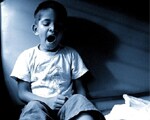Children with an autism spectrum disorder (ASD) tend not to yawn contagiously - that is, yawn in response to seeing others yawn.

Yawning is a type of "emotional contagion," an unconscious response that reflects recognition of how others are feeling. And unconsciously mimicking the behaviour of parents and others is an important step in a child's social and emotional development.
Autistic children's lack of imitation puts them at a disadvantage when it comes to learning empathy and other social skills. For example, prior research has shown that when people see others smile, they subtly smile as well. The movement of the facial muscles kicks a feedback mechanism into gear, lifting mood. 'Emotional contagion' gives rise to intuition, empathy and good social skills. The fact that autistic children are not yawning is a signal those basic social bonds that are forming in infants and children are not forming in children with autism.
Researchers in USA observed 120 typically developing children aged 1 to 6 years while they listened to a 12-minute story read aloud. The storyteller yawned four times during the reading. The children began "contagious yawning," or yawning within 90 seconds of
seeing the storyteller yawn, at about age 4. About 35 percent of 4-year-olds and 40 percent of 5- and 6-year-olds yawned in response to seeing the storyteller yawn; none of the 1-year-olds, 5 percent of 2-year-olds and 10 percent of 3-year-olds yawned.
In another experiment, the researchers observed 28 children ages 6 to 15 with an autism spectrum disorder and 63 children without autism who were matched for age or mental development. Again, the storyteller yawned four times. Only about 11 percent of children with an autism spectrum disorder yawned after the storyteller yawned, compared to 43 percent of typically developing children.
Among children with autistic disorder, a more severe form of the syndrome, none yawned contagiously, while about 23 percent of kids with pervasive developmental disorder - a milder form of autism - yawned. Typical infants seem to be growing more emotionally attuned with others as they age, with the age of 4 being critical for that. Kids with autism don't seem to be becoming more and more emotionally attuned with others as they age.
The study did not prove that a lack of 'contagious yawning' is a sure sign of a developmental problem. The researchers noted that it is possible that the autistic children weren't paying attention to others around them, or they noticed the yawns and other facial expressions but didn't know how to interpret them. Given that contagious yawning may be a sign of empathy, this study suggests that empathy -- and the mimicry that may underlie it - develops slowly over the first few years of life, and that children with ASD may miss subtle cues that tie them emotionally to others. Intervention programs that target imitation skills can be very effective in helping children with autism in their social development.
DoctorNDTV is the one stop site for all your health needs providing the most credible health information, health news and tips with expert advice on healthy living, diet plans, informative videos etc. You can get the most relevant and accurate info you need about health problems like diabetes, cancer, pregnancy, HIV and AIDS, weight loss and many other lifestyle diseases. We have a panel of over 350 experts who help us develop content by giving their valuable inputs and bringing to us the latest in the world of healthcare.












